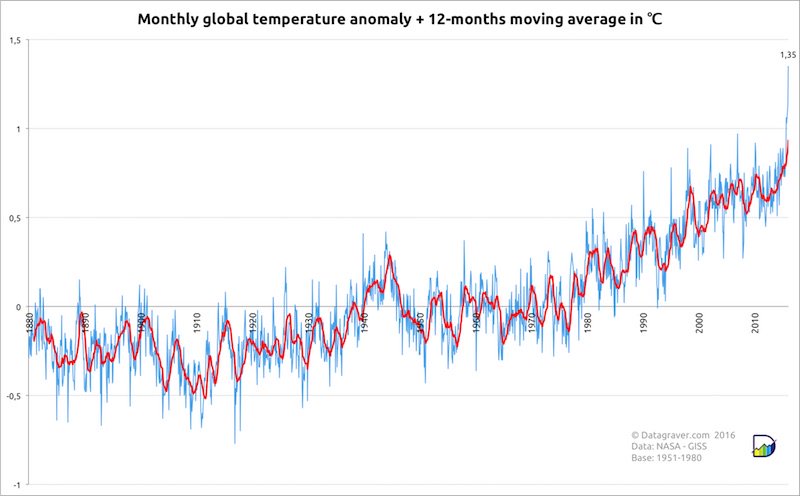Losing,
losing...lost.
This interview should be available soon on YouTube
Record-breaking
heat shows world 'losing battle' against climate change, Alan Finkel
tells Q&A
Australia's chief scientist has warned the planet is "losing the battle" against climate change, after new data showed February set a "completely unprecedented" record for the hottest month since global records began.Key points:
- February was the hottest seasonally adjusted month since records began in 1880
- Global temperatures are around 1C warmer than the pre-industrial average
- Chief scientist Alan Finkel tells Q&A the world is losing battle against climate change
ABC,
15
March, 2016
The data released by NASA compared each month going back to 1880 against average temperatures between 1951 and 1980, and confirmed preliminary analysis that February was the hottest month on record.
"You
wouldn't want to dismiss it. There is genuine reason for concern,"
Dr Alan Finkel said during an appearance on the ABC's Q&A
program, whichfocused
on science and also discussed AI and gender equality.
"What
we are doing with solar, wind, changing practices, behavioural
practices and things like that, we're not winning the battle."
Meteorologist
Dr Jeff Masters said although the absolute hottest month on record
was July 2015, July and August tend to be 4C hotter than January and
February because the large land mass in the Northern Hemisphere cools
the planet during the northern winter.
Writing
on the Weather Underground blog, Dr Masters and his co-author Bob
Henson said February was exceptional because it was 1.35C hotter than
the long-term average, while July was only 0.75C hotter than average.
"Perhaps
even more remarkable is that February 2015 crushed the previous
February record [set during the peak of the 1997-98 El Nino] by a
massive 0.47C," they wrote.
The
previous record was January this year, at 1.14C hotter than average,
which broke the December 2015 record of 1.10C.
NASA's
data also showed that although October 2015 was the first month since
1880 to be more than 1C warmer than average, every month since
October has exceeded that mark.
The
last month to be colder than average was September 1992, and the last
year with two months colder than average was 1978.
Warming 'completely unprecedented', world now in a climate emergency
Dr
Masters and Mr Henson described February's result as "an
extraordinary margin to beat a monthly world temperature record by,"
and an "ominous milestone".
"This
result is a true shocker, and yet another reminder of the incessant
long-term rise in global temperature resulting from human-produced
greenhouse gases," they said.
"We
are in a kind of climate emergency now," he said.
"Governments
have promised to act and they need to do better than what they
promised in Paris."
The
COP21 climate conference in Paris signed an agreement in December
2016 that repeated a 2C target but said the world should pursue a
target of limiting warning to 1.5C above pre-industrial levels.
However,
Dr Masters said the world is already 1C warmer than the late
nineteenth century, and heat stored in the oceans has already
committed us to at least another 0.5 degrees of atmospheric warming.
"In
short, we are now hurtling at a frightening pace toward the globally
agreed maximum of 2.0C warming over pre-industrial levels," he
said.
Dr
Masters said the next several months should remain well above the
long-term average, and 2016 may top 2015 as the warmest year in
global record-keeping.



 Stefan Rahmstorf
Stefan Rahmstorf









No comments:
Post a Comment
Note: only a member of this blog may post a comment.